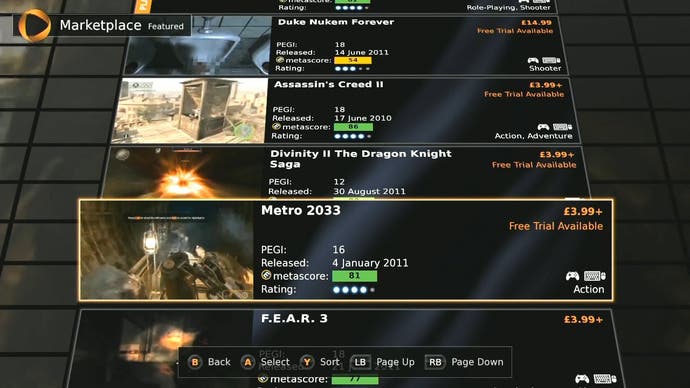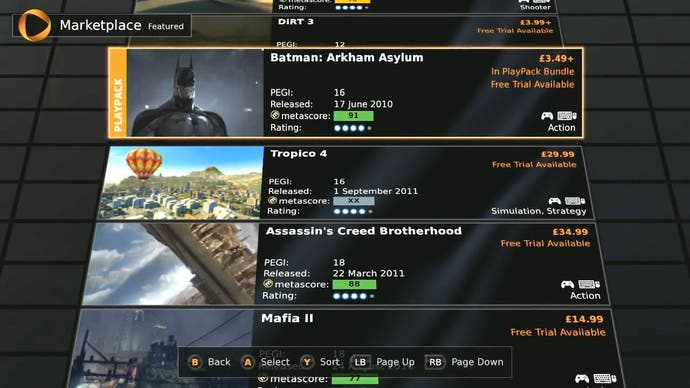Digital Foundry vs. OnLive UK
So then: can it possibly work?
Pricing/Value
In our first OnLive article, the central criticism over and above system performance concerned value. The notion of charging more for games than Amazon or Steam was at odds with the fact that the user had no ownership or resell rights whatsoever, along with the fact that the games themselves were fundamentally compromised to various degrees - whether it was down to the lag or the image quality, or the fact that isn't actually a high-end PC on the other end of the line serving up the graphics, resulting in visual cutbacks.
In this respect, OnLive deserves credit for coming up with an innovative solution in the form of the "all you can eat" PlayPack, which offers a vast range of over 100 titles that you can play at will with no limitations for just £6.99 a month. There are no recent titles in the PlayPack line-up, but you do get some really good games: Just Cause 2, Borderlands and Batman: Arkham Asylum are in there, for starters. Multiplayer-only variants of recent-ish titles like F.E.A.R. 3 and Homefront are also available. The PlayPack proposition looks good on paper, but becomes even stronger from a value perspective if you compare all that if offers against the value of an Xbox Live or PlayStation Plus subscription.
You don't just get a raft of free games either. Subscriber status also confers the right to 30 per cent off the price of all full purchases going forward. This can help to bring OnLive's skewed pricing for newer games more into line with what you might expect to play elsewhere. For example, at the time of writing, Deus Ex: Human Revolution costs £34.99 on OnLive and £29.99 on Steam while the Xbox 360 version is currently £17.99 on Amazon. If the streaming service manages to get more titles released day and date with the other versions, that 30 per cent discount could actually result in cheaper day-one prices than some console releases.
But in the here and now, how do OnLive's latest releases compare? Here's a table with a number of interesting comparisons. With Tropico 4, which has yet to be released on 360, we see an OnLive price advantage and it does compare well with Steam. However on the other titles, OnLive is shown to be at a significant disadvantage. Not only is Steam cheaper in some cases, but market forces have taken their toll on what are now older titles, making them significantly less expensive if you want to own a physical product.
| - | OnLive | Steam | Amazon (PC) | Amazon (360) |
|---|---|---|---|---|
| Deus Ex: Human Revolution | £34.99 | £29.99 | £17.99 | £17.99 |
| Tropico 4 | £29.99 | £29.99 | £22.48 | £39.99 (pre-order) |
| DiRT 3 | £39.99 | £29.99 | £16.75 | £22.00 |
| Red Faction: Armageddon | £29.99 | £29.99 | £15.08 | £17.19 |
It's self-evident that for the more casual gamer the PlayPack product is very strong, but the notion that the player has no fundamental ownership rights to the games being purchased still presents unavoidable issues for the traditional console audience. You can't sell your games when you are finished with them, you can't lend them to friends, and you can only buy them at the prices OnLive and its partners set. It's also hard to let go of the fact that OnLive is presenting its titles at the equivalent of full-retail prices when the overall experience of the game generally isn't as good as the current-generation consoles, where the free market relentlessly drives down prices.
However, it is equally clear that the revamped OnLive pricing structure does present value for a different type of player. A £6.99 subscription price is very fair indeed for the games on offer, and without having to buy in on console hardware, the barrier for entry is very cheap too - use your existing PC and the only real investment you should make is in an Xbox-compatible gamepad. Stick with mouse and keys by all means, but it's not the preferred input system for OnLive, serving to accentuate the latency issues. The alternative is to go for the micro-console of course. At £69.99 it may not be an impulse buy, but it is clearly the cheapest "HD" console system on the market today, plus there is the fact that (in theory at least) you will never need to upgrade it.


It also should be said that OnLive does have value to core gamers too, but probably not in the way that the platform holder would probably like. The ability to dip in at will and play the first 30 minutes of virtually any game on the system, as many times as you like, makes it an enviable platform just for sampling games. What is also commendable about the demo system is that you get ample time to experience how the game plays on the OnLive infrastructure - every game will be compromised to differing extents - whether it's in terms of latency, video quality, or through reduced graphical features server-side.
And if you're happy with the experience, you can play on immediately: no waiting for Amazon to mail you the game, no trip to the shop necessary, the whole experience is remarkably friction-free. If you're not happy with the compromises, but you do like the game, the fact that there are no OnLive platform exclusives means that there's nothing to stop you buying the same game for your existing PC or console.
In the era of the eight-hour single-player campaign, OnLive's rental options could also prove to be compelling to the core gamer. In this respect though, the inconsistency in the overall offering is still frustrating. The vast majority of games have playable demos. Some have demos and the ability to purchase the game, but others such as Deus Ex: Human Revolution and Homefront offer no rental or demo options at all. You can only buy sight unseen, and this is not good. This isn't OnLive's fault of course, but annoyances like this, combined with the paucity of day-and-date releases with its console brethren suggest that publishers really need to decide if they're in or out with the platform.








